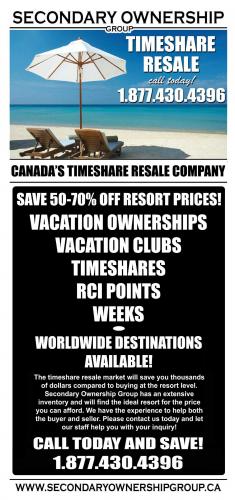Timeshares are based upon the concept of fractional ownership in a home. For instance, if you acquire one week at a timeshare condominium each year, you own 1/52nd portion of the unit. If you acquire one month, you own 1/12th of the system. Other purchasers buy the staying portions. There are two general schemes: Deeded: You purchase an ownership interest in the residential or commercial property. Non-Deeded: You lease the right to utilize the property for a specific quantity of time each year for a pre-programmed variety of years. A timeshare is a type of fractional ownership in a home, usually in a resort or vacation location.
Timeshares must not be considered investments, considering that the vast majority of timeshare agreements decline in the secondary market and they do not produce earnings for owners. From there, the numerous ownership structures become more intricate. You can acquire a fixed week, which implies that you own the right to use the system during the very same week each year, or you can purchase a floating week, which normally provides you the right to utilize the property throughout a predetermined time period. Some residential or commercial properties run on a point system. These are typically referred to as "getaway clubs." With these, you buy a specific number of points that can be redeemed at a range of destinations.
Cost differs by: System size Area Deed Brand Time period purchased (e. g., December versus August at a ski resort) Timeshare properties can often include bigger and more glamorous accommodations than basic hotels and are usually situated in desirable places. When you are standing in a lovely condominium ignoring the perfect beach and sparkling blue water, it is easy to catch the sales pitch. Remember, timeshare salespeople remain in business of selling. However simply due to the fact that they inform you that you are getting a lot, it doesn't imply that you actually are. Before you purchase, spend some time to look into the residential or commercial property and speak to other timeshare owners.
Points-based systems included no warranties. Just because the salesperson tells you it's simple to trade your week for another week or your property for another residential or commercial property, doesn't indicate it truly will be simple. If you own a Look at more info week in Hawaii, would you be prepared to trade it for a journey to the blistering hot Las Vegas desert in August? If you would not, opportunities are no one else will either. It's also crucial to bear in mind that everybody wishes to take a trip to the exact same locations and in the very same weeks that Article source you do. The desirability factor aside, trading typically leads to an extra fee.
Likewise, if the residential or commercial property requires a brand-new roofing system or a brand-new sewage line, a "one-time" evaluation will be levied. Some homes also charge various charges, such as a publication charge if you want to see other homes that may be available for trade, and extra costs if they help you offer your property. While a lifetime of vacations sounds excellent, will the management business that offered you the timeshare be around 3 years from now? If you are thinking about a timeshare in a foreign country, you should also comprehend the laws and understand what the outcome will be if the timeshare management business closes.
Not known Details About What Is The Detector On The Wall Below The Smoke Detector In Your Timeshare Unit


That condominium on the ski slopes might look excellent today, but five years from now when you are a taking care of a baby or are suffering from a herniated disk, your days on the slopes may be over, but the costs for the timeshare will continue. Think about that your desire to hop on an aircraft might subside as fuel expenses increase, airport security ends up being more onerous and the aging procedure makes you less tolerant of travel. A timeshare is not an investment. Investments are designed to appreciate in value, create income or do both. A timeshare is not likely to do either, despite what the sales representative says.
Thus, selling for an earnings is an uphill struggle considering you require to convince somebody to pay more for a used unit and consider all the costs you paid over the years. The very nature of the sales procedure must be a hint about the reality of the issue. Have you ever became aware of a shared fund, local bond or any other financial investment that offered you a totally free weekend in Miami just for giving the product a try? A timeshare is not a financial investment, it's a vacation. It's likewise an illiquid possession that is most likely to decline over time - how to get out of a holiday inn club timeshare.
If you do take the plunge, bear in mind that you are buying a repeatable holiday. Simply as investing $3,000 on a journey to an unique beach is not a financial investment, neither is spending $10,000 plus upkeep charges on a timeshare. If you have actually discovered a getaway location that you absolutely like and desire to return to every year and have chosen that a timeshare is a perfect method to achieve your objective, go ahead and buy one. However purchase it utilized. Current owners that are tired of the maintenance costs, tired of the destination, or have grown frustrated with their efforts to trade their slot so that they can go to a different location might be prepared to offer their timeshares away at a fraction of the original expense.
Buying used gives you all the advantages of ownership at the portion of the expense. Even if you choose a more costly system, you can save cash by financing your purchase with a personal loan, which must provide you an interest rate that is significantly lower than the rate the timeshare company charged the original owner. Like any significant purchase, the decision to buy into a timeshare requires careful consideration. It involves a big amount of money in advance and considerable repeating expenses. You need to ask a lot of concerns how to sell bluegreen points and take your time making a decision - how to report income from timeshare. And as the Federal Trade Commission (FTC) says in its Customer Details: "The value of these alternatives remains in their use as vacation destinations, not as investments.".
Owning a piece of a villa sounds best, doesn't it? A location to call house and see again and again, knowing it's yours for a week or 2. And you might think about buying a timeshare to make this dream a reality. Quick recap on timeshares: A timeshare is a holiday house split between folks who buy into it for the right to utilize it when a year for a set time period. These individuals pay a lot of money upfront to ensure their week every year to vacation in this timeshare area. But here's a little trick: You do not need to own a timeshare to use a timeshare! So, let's put timeshares on a time-out for a minute! They might seem like a good idea, however are timeshares really worth it? Are they worth all of your hard-earned cash and worth parting with even more of your money year after year once you've gotten on board the timeshare train? No matter how you slice it, timeshares are not worth purchasing into.